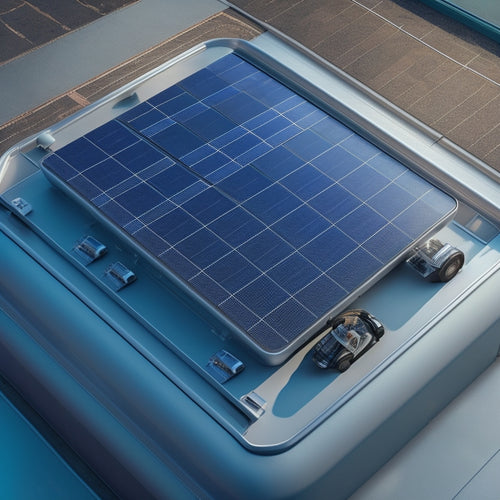
Best Home Battery Backup Solutions for Uninterrupted Power
Share
You're looking for a reliable home battery backup solution to guarantee uninterrupted power during outages and reduce your grid reliance. Top systems include Tesla Powerwall, LG Chem RESU, and Sonnen eco, each offering advanced features like load shifting and smart energy management. When choosing a system, consider key factors like battery chemistry, capacity, inverter efficiency, scalability, and warranty. Upfront costs range from $5,000 to $20,000, and ongoing maintenance fees apply. As you weigh your options, you'll want to investigate the latest advancements in battery technology, which promise to enhance energy density, longevity, and overall performance - and that's just the beginning.
Key Takeaways
- Tesla Powerwall, LG Chem RESU, and Sonnen eco are top battery backup systems offering sleek design, high energy density, and seamless solar integration.
- Key features to consider when choosing a battery backup system include battery chemistry, capacity, inverter efficiency, scalability, and warranty.
- Upfront system costs range from $5,000 to $20,000 or more, with ongoing maintenance fees and installation complexity affecting overall cost.
- Regular maintenance, software updates, and safety protocols are essential for peak performance, longevity, and safety of home battery backup systems.
- Advancements in battery materials, such as solid-state and lithium innovations, are expected to enhance energy density, longevity, and reliability in home battery technology.
Top Battery Backup Systems
When it comes to home battery backup solutions, a reliable system is essential to guarantee uninterrupted power supply during outages. You need a system that can seamlessly integrate with your solar panels, providing you with grid independence when the utility grid fails.
Top battery backup systems offer advanced solar integration capabilities, allowing you to store excess energy generated during the day for use during the night or when the grid is down.
Some of the top battery backup systems on the market include the Tesla Powerwall, LG Chem RESU, and Sonnen eco. These systems are designed to provide you with a high level of energy autonomy, allowing you to power your home with confidence.
With advanced features like load shifting, time-of-use optimization, and smart energy management, you can rest assured that your home will remain powered during outages.
Understanding Home Energy Storage
In the midst of a rapidly changing energy environment, understanding home energy storage has become an integral aspect of achieving grid independence and reducing your reliance on the utility grid.
As you venture into the world of home battery backup solutions, it's vital to grasp the concept of energy management. This involves monitoring and controlling your energy usage, ensuring that your home's energy needs are met efficiently.
With solar integration, you can utilize renewable energy and store it for later use, further reducing your dependence on the grid.
A home energy storage system allows you to optimize your energy consumption by storing excess energy generated during the day for use during peak hours or when the grid is down.
This not only saves you money but also provides a reliable backup power source during outages.
Key Features to Consider
You've assessed the benefits of home energy storage and are now ready to evaluate the key features of a battery backup solution that meets your needs.
When selecting a solution, take into account the type of battery chemistry used, such as lithium-ion or lead-acid, as each has its own advantages and disadvantages. The capacity and depth of discharge (DOD) of the battery are also vital, as they determine how much energy you can store and use.
Additionally, look for solutions with high inverter efficiency and compatibility with your existing solar panel system or inverter brand. Solar integration is fundamental if you plan to charge your battery with renewable energy. Inverter compatibility guarantees seamless integration with your existing infrastructure.
Other key features to take into account include the system's scalability, monitoring and control capabilities, and warranty and support options.
Best Brands for Home Use
With numerous home battery backup solutions on the market, selecting the right brand for your specific needs can be overwhelming. You want a brand that's reliable, efficient, and meets your energy storage requirements.
To narrow down your options, consider top battery brands that have received positive user reviews.
Tesla, LG, and Sonnen are popular choices among homeowners. Tesla's Powerwall is a sleek, compact solution that integrates seamlessly with solar panels. LG's Chem RESU offers a high energy density and long lifespan. Sonnen's eco battery is designed for off-grid and grid-tied applications, providing backup power during outages.
Other notable brands include SimpliPhi Power, Generac, and Schneider Electric. SimpliPhi's lithium-ion batteries are known for their safety and durability. Generac's PWRcell is a thorough energy storage system that provides whole-house backup power. Schneider Electric's SE3800 is a scalable, modular solution for homes and small businesses.
When researching top battery brands, read user reviews to get a sense of their performance, installation, and customer support. This will help you make an informed decision and find the best brand for your home battery backup needs.
Cost and Installation Factors
You'll need to evaluate the upfront system costs, which can range from $5,000 to $20,000 or more, depending on the brand, model, and capacity of the home battery backup solution.
Additionally, you should factor in ongoing maintenance fees, which may include annual inspections, software updates, and replacement of worn-out components.
The installation complexity factors, such as the need for electrical upgrades or additional hardware, will also impact the overall cost and feasibility of the project.
Upfront System Costs
During the initial investment phase, a significant portion of your budget will be dedicated to upfront system costs, comprising the purchase and installation of the home battery backup solution. These costs can be substantial, but they're a vital part of guaranteeing uninterrupted power in your home.
When evaluating upfront system costs, you'll need to factor in the following:
-
The cost of the battery itself: This is typically the largest portion of the upfront investment, and prices vary widely depending on the type and size of the battery.
-
Installation costs: These include the cost of labor, materials, and any necessary electrical upgrades to your home.
-
Additional components and accessories: You may need to purchase additional equipment, such as inverters or charge controllers, to confirm your system functions properly.
It's essential to reflect on financing options to help make your upfront investment more manageable. Many manufacturers and installers offer financing plans or partnerships with lenders to help you get the system you need without breaking the bank.
Ongoing Maintenance Fees
Beyond the initial investment, your home battery backup solution requires ongoing attention to secure peak performance and extend its lifespan. This is where ongoing maintenance fees come into play. You'll need to take into account the cost of regular check-ups, software updates, and potential repairs. Some manufacturers offer ongoing service plans that can provide peace of mind, but these come at a cost.
When comparing different solutions, it's important to factor in the ongoing maintenance fees. Some providers may charge a flat annual fee, while others may charge per visit or per repair. You'll want to take into account the total cost of ownership, including the initial investment and ongoing maintenance fees, to get an accurate depiction of the system's overall cost.
Fee comparison is significant to guarantee you're getting the best value for your money. Be sure to ask about the frequency of maintenance visits, the cost of replacement parts, and any additional fees associated with the ongoing service.
Installation Complexity Factors
The complexity of your home battery backup solution's installation can greatly impact its overall cost and effectiveness, depending on factors such as the system's size, type, and placement within your home.
As you consider your installation options, keep in mind the following key factors that can affect complexity and cost:
-
Installation locations: Solutions requiring outdoor installation, such as whole-house generators, may need additional permits, excavation, and weather-resistant components, increasing complexity and cost.
-
Wiring requirements: Systems that require extensive rewiring or dedicated electrical circuits may necessitate more labor hours, materials, and inspections, driving up installation costs.
-
System integration: Solutions that integrate with existing solar panels, electrical panels, or smart home systems may require additional programming, testing, and configuration, adding to the overall complexity and expense.
Maintenance and Safety Tips
Several key maintenance and safety tips can help guarantee your home battery backup system operates efficiently and safely.
You should regularly inspect your system's components, looking for signs of wear or damage. Keep the area around your battery clean and clear of obstructions to guarantee proper airflow and heat dissipation. This will help maintain peak battery health.
It's also vital to follow the manufacturer's recommended maintenance schedule, which may include software updates and diagnostic checks. Always adhere to safety protocols when performing maintenance tasks, such as disconnecting the system from the grid and wearing protective gear.
Additionally, verify that your system is installed and configured to meet local electrical codes and regulations. By following these tips, you can minimize the risk of accidents and verify your system operates reliably when you need it most.
Future of Home Battery Technology
You're likely wondering what's on the horizon for home battery technology.
Researchers are exploring advanced battery materials that will increase energy density, allowing you to store more power in a smaller footprint.
As these innovations come to market, you can expect longer lifespan expectations and more efficient battery performance.
Advanced Battery Materials
Five breakthroughs in advanced battery materials are set to revolutionize the future of home battery technology.
You're likely to benefit from these innovations, which promise to make your home battery backup system more efficient, reliable, and cost-effective.
-
Improved safety: Solid-state batteries replace the flammable liquid electrolyte in traditional lithium-ion batteries with a solid material, reducing the risk of fires and explosions.
-
Enhanced performance: Lithium innovations, such as lithium-nickel-manganese-cobalt-oxide (NMC) chemistry, elevate energy density and cycle life, allowing your home battery to store more energy and last longer.
-
Increased sustainability: New battery materials like lithium-iron-phosphate (LFP) and sodium-ion batteries offer a more environmentally friendly alternative to traditional lithium-ion batteries, reducing the carbon footprint of your home energy system.
These advancements in advanced battery materials will play a vital role in shaping the future of home battery technology, enabling you to enjoy uninterrupted power with peace of mind.
Increased Energy Density
As you consider upgrading to a home battery backup system, one critical factor to keep in mind is energy density. This refers to the amount of energy stored per unit of mass or volume. Higher energy density benefits your home by allowing for more efficient use of space, reducing the overall size and weight of the battery system. This, in turn, makes installation and maintenance easier and more cost-effective.
With advancements in technology, high capacity batteries are becoming more accessible. These batteries boast increased energy density, providing more power in smaller packages. This is particularly important for homeowners who require a reliable backup power source during outages. With higher energy density, you can enjoy uninterrupted power for longer periods, keeping your essential appliances running smoothly.
The advantages of increased energy density extend beyond convenience. It also enables more efficient charging and discharging, reducing the wear and tear on your battery system. This means you can enjoy a longer-lasting and more reliable power backup solution, giving you peace of mind in the face of unexpected outages.
As you investigate home battery backup options, prioritize energy density to reap the benefits of a more efficient and effective system.
Longer Lifespan Expectations
Reliability is a cornerstone of home battery backup systems, and advancements in technology are driving longer lifespan expectations for these solutions. You can expect your home battery backup system to last longer, providing you with uninterrupted power when you need it most.
Several factors contribute to a longer battery lifespan, including ideal charging practices, efficient battery management systems, and high-quality battery cells. By understanding these battery lifespan factors, you can take steps to maximize the life of your home battery backup system.
Some benefits of longer lifespan expectations include:
-
Reduced maintenance costs: With a longer lifespan, you'll replace your batteries less often, saving you money on maintenance and replacement costs.
-
Increased peace of mind: A reliable home battery backup system provides you with confidence that your power will stay on, even during extended outages.
-
Greater overall value: A longer-lasting battery backup system means you'll get more value from your investment, providing you with a greater sense of security and belonging in your home.
Frequently Asked Questions
Can I Use a Home Battery Backup System With Any Inverter Type?
You can pair a home battery backup system with various inverter types, but it's vital to guarantee inverter compatibility, considering factors like voltage, frequency, and communication protocols, which may vary depending on your chosen battery types, such as lead-acid or lithium-ion.
How Do I Ensure My Battery Backup System Is Compatible With My Solar Panels?
You'll verify battery compatibility by checking the voltage, ampere-hour rating, and communication protocols of your solar panels and battery backup system, guaranteeing seamless solar integration and ideal performance in your hybrid setup.
Are Home Battery Backup Systems Covered Under Homeowners' Insurance Policies?
You'll want to review your homeowners' insurance policy to see if your battery backup system is covered; check for insurance coverage specifics, as policy exclusions may apply, and consider adding a rider for added protection.
Can I Expand My Home Battery Backup System in the Future if Needed?
You'll be relieved to know that 75% of homeowners plan to invest in energy storage solutions, and you're ahead of the curve. As your energy needs evolve, you can easily expand your home battery backup system in the future through system upgrades, ensuring seamless future expansion.
Do Home Battery Backup Systems Require a Dedicated Electrical Subpanel?
When you install a home battery backup system, you'll likely need a dedicated electrical subpanel to guarantee safe and efficient battery installation, which allows for optimized energy capacity and easy future upgrades.
Conclusion
As you gaze out at your home, now fortified with a reliable battery backup system, you can't help but wonder: what would happen if the grid failed tomorrow? With the best home battery solutions, you'll be prepared to weather any storm. With a seamless shift to backup power, your lights will stay bright, your fridge will keep humming, and your life will remain uninterrupted. In a world where energy independence is the new norm, you'll be ahead of the curve, basking in the comfort of a secure, self-sufficient home.
Related Posts
-

Top Solar Panels for Car Battery Maintenance
When selecting top solar panels for car battery maintenance, consider high-efficiency models with high wattage output...
-

What Makes a Road Bike-Friendly by Design?
As you plan and design roads, incorporating features like dedicated bike lanes, smooth surfaces, and traffic calming ...
-

Safely Staying on Course: 5 Essential Lane Tips
You're about to take your driving skills to the next level by mastering the art of staying in your lane. First, inves...


